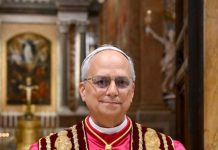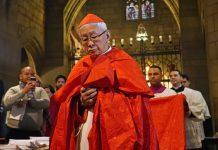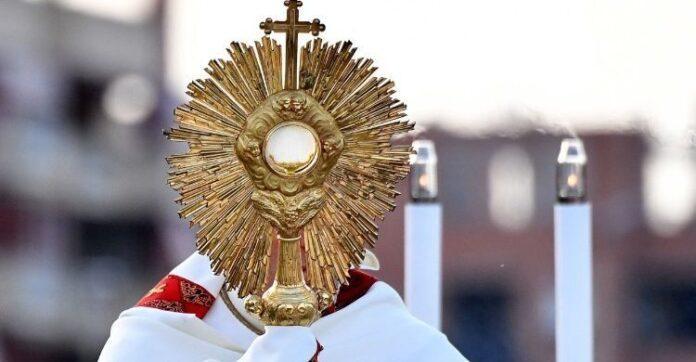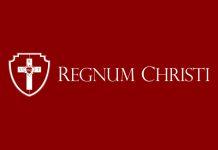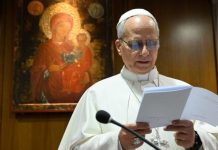Nothing has equal value to that tiny white disk of consecrated wheat bread, containing Our Lord; it is the same God Who becomes restorative food and the remedy of immortality. Let us make a sad but obvious statement: the healing power of the Eucharist is ignored in the current pandemic…
Newsdesk (08/06/2021 10:58, Gaudium Press) To our kind readers we present a few paragraphs of an article on the Eucharist by Prof. Plinio Corrêa de Oliveira. It appeared on 10/14/1934 in ‘O Legionário’, the official voice of the Archdiocese of São Paulo, and of which the author was both founder and director. The years that have passed since the publication of this article do not diminish the timeliness of his reflections.
The referred article came to light at the closing of the XXXII International Eucharistic Congress, held in Buenos Aires in 1934. Due to the truly large numbers of people attending the public events, it was the most important mass event in Argentina, even until today. Those were other times…
Now it is the turn of the Hungarian city of Budapest, one of the most beautiful capitals in Europe, to host a new great Eucharistic event. Under the auspices of Cardinal Peter Erdo, Archbishop of Budapest, the International Eucharistic Congress will take place in September, where our Federation will also be present.
It is always important to preserve social peace. Good relations between nations and harmony within each one is a primary concern in times of armed tensions – which, by the way, are not lacking in these times – nor are disorder and unrest in the streets, whose motivation is social discontent. While the broth that would give rise to World War II was brewing, Dr. Plinio pointed to the Eucharistic cult as the privileged manner of obtaining peace, which in the words of St. Augustine, is simply the “tranquility of order”.
* * * * *
It is not difficult to find a relationship between Eucharistic Congresses and social peace. Wars are always the fruit of exacerbated passions. And just as among individuals, the virtue of the parties overrules the impulses of self-love and keeps reciprocal relations in harmony, so among nations Christian virtue should reign to prevent the excesses of national passions.
Now, the Eucharistic Congresses contribute greatly to this. First, because in them there is a consecration of the transcendent royalty of Our Lord Jesus Christ. Representatives from the most diverse countries come together to prostrate before and recognize the supreme sovereignty of the King of Kings, from Whom all power on earth comes. This spectacle cannot fail to impress the rulers of this world – they will feel the precariousness of their sovereignty, they will perceive that their authority is not absolute or unlimited, but that it must bow before a more exalted one which asks for norms by which to regulate itself.
Then, the Eucharistic Congresses favor a deeper knowledge of Our Lord Jesus Christ. He no longer appears as simply the Redeemer who once sacrificed Himself for men that they might merit a crown of glory in the afterlife. His Eucharistic life, perpetuating the sacrifice, invites men to a reflection on the perennial aspect of His Passion, the motives that determine it, and its daily influence on souls. The life of grace comes to light, the life established by Our Lord, as a reality that must be lived and intensely so. Hence, the most hidden fruits, which ripen in the depths of hearts: the reformation of individuals.
The life in which religion is not an accidental addition, but the single motive which gives supernatural vitality to all the actions of the individual, is a covering of Christ, in the words of St. Paul.
Let it not be said that these fruits, all spiritual, are of little value in society. No real separation is possible between individuals and society. There is no abstract society to which norms and reforms can be applied without considering the men who compose it. They are always the members of that society into which they enter entirely, body and soul, with whatever vices and virtues they may possess. And since vices contribute to disorder and uneasiness, virtues are elements of order and peace.
Social peace depends, therefore, very much on the internal peace of each one of you, and know that it is subordinate to the exact fulfillment of your duties towards God and towards your neighbor. Our Lord’s teachings provide this understanding; Our Lord’s examples facilitate its execution: both things are obtained in the Eucharistic Congresses. Truly the peace of Christ can only be obtained with the reign of Christ in individuals and society.
* * * * *
When the faithful understand their supernatural purpose and begin to fulfill their duties towards God and their neighbor, things will be different! Of the duties to be undertaken, one is paramount: the worship of the Blessed Sacrament of the Altar.
Lapped by the waters of the Danube, Budapest will be enriched by the wonderful experience of seeing the divine Prisoner of the tabernacle, recognized and celebrated in its churches, streets, and squares. Many of the city’s monuments evoke glorious pages of its history, either of jubilation or pain; some have been declared World Heritage Sites. But nothing has the value of that tiny white disk of consecrated wheat bread, containing Our Lord; the same God Who becomes restorative food and the medicine of immortality. Let us make a sad but obvious statement: the Eucharist is the ignored remedy in the current pandemic. It will only be understood when men are made aware of its eternal and supernatural purpose.
May St. Stephen, the first Magyar King and holy founder of Hungary, whose millennium we are celebrating, and Blessed Charles IV of Habsburg, the last Apostolic King of this noble people, intercede from Heaven so that the International Eucharistic Congress may be an occasion of great graces and contribute to the establishment of “tranquility of order” in the Hungarian nation, throughout the earth.
By Father Rafael Ibarguren EP – Ecclesiastical Assistant of the Eucharistic Works of the Church.










